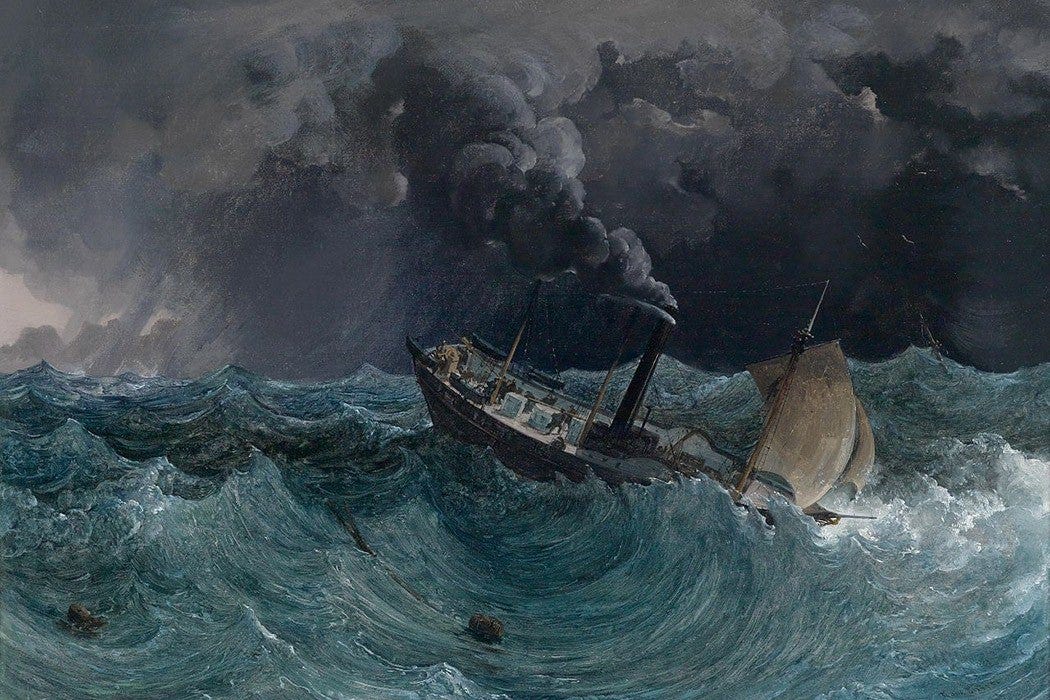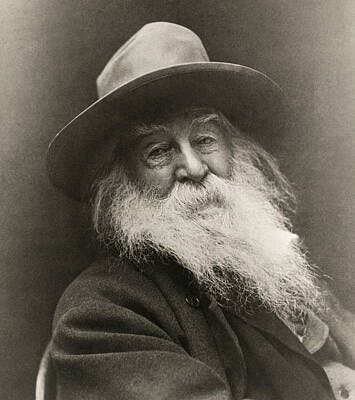This one is a little different. It’s an excerpt of Walt Whitman’s inescapable poem Leaves of Grass. It’s one of my favorite pieces of writing. It’s also a fantastic scene. So I’m going to break it down and show you what makes it great. Here’s the whole thing, then I’ll take it beat by beat.
I understand the large hearts of heroes,
The courage of present times and all times,
How the skipper saw the crowded and rudderless wreck of the
steamship, and Death chasing it up and down the storm,
How he knuckled tight and gave not back an inch, and was faithful of
days and faithful of nights,
And chalk’d in large letters on a board, Be of good cheer, we will
not desert you;
How he follow’d with them and tack’d with them three days and
would not give it up,
How he saved the drifting company at last,
How the lank loose-gown’d women look’d when boated from the
side of their prepared graves,
How the silent old-faced infants and the lifted sick, and the
sharp-lipp’d unshaved men;
All this I swallow, it tastes good, I like it well, it becomes mine,
I am the man, I suffer’d, I was there.
I’m going to take it couplet by couplet and write it as if I were adapting it to film. If you were writing it, you might spend more time with the people on the rudderless wreck. Maybe you would have more or less conflict among the crew of the rescue ship. Perhaps you would place the Captain’s family on the wreck.
They’re all valid choices. My point is that core of the scene and all of the important images are all there in the words of the poem. The “house” of this scene stands on it’s own, all I’m doing is making choices about how do decorate the interior.
I understand the large hearts of heroes,
The courage of present times and all times,
This sets our expectation. With a film, it would be set partially by the genre. Partially by the trailer and reviews. We have a topic. Courage.
How the skipper saw the crowded and rudderless wreck of the
steamship, and Death chasing it up and down the storm,
Dark clouds, darker water. The ship taking on water. The engineer saying, “We canna take much more of this.” And then, in the flash of lightning. The wreck, storm-tossed. Doomed, rolling sideways in the waves. A few small figures lose their grip and are washed overboard.
The first Mate curses and looks away from the horror of it. The second mate says softly, “There’s nothing we can do… what can we do?” The Helmsman cross himself, and when the does, the wheel spins with the force of the waves.
The Captain puts his hands on the oak of the wheel and rights the ship, gently shouldering the helmsman out of his way.
“Captain?” asks the First Mate?
“Helmsman, below,” orders the Captain, “We’ll take shifts.”
Close on the Captain’s hands gripping the wheel.
How he knuckled tight and gave not back an inch, and was faithful of
days and faithful of nights,
Shifts pass, and the Helmsman comes to relieve the Captain and is sent away, again and again. The night turns to day, and the storm does not relent. But neither does the Captain.
The First Mate makes a passionate appeal. “Think of the men. We don’t even know how many, if any are left alive on that hulk.”
“There!” says the Captain. From the ruin of the steamship’s bridge, we see a tiny figure, brandishing a flare against the crushing darkness of the elements.
“Helmsman take the wheel, bring us alongside as close as you can get us.”
And chalk’d in large letters on a board, Be of good cheer, we will
not desert you;
The Captain writes frantically, with a piece of chalk. We don’t see what he is writing. A shot from the foundering wreck. The steamship carreens wildly, yet we can see a tiny figure across the water. It is the Captain holding the sign high, “We will not desert you.”
How he follow’d with them and tack’d with them three days and
would not give it up,
Days pass. The rescue ship takes on water and they man the pumps. The crew starts to drop from exhaustion, but the Captain rallies them, just with his presence. He has not slept.
The First Mate says, “Sir, we must seek safe harbor.”
The Captain, “Just a little longer…”
“Sir…”
“A little longer…”
The First Mate huddles with the Engineer and the Second Mate. The Second Mate asks, “Do we relieve him?”
The Captain at the wheel. Haggard, exhausted, but determined.
The First Mate opens his mouth to speak. The Second Mate is urgent, “We have to relieve him, right?” The First Mate seems ready to agree, but something in him changes. He frowns at the Second Mate. “A little longer, Mr. Carstairs. A little longer.”
The clouds part and the sun sun shines through.
The rest speaks for itself.
How he saved the drifting company at last,
How the lank loose-gown’d women look’d when boated from the
side of their prepared graves,
How the silent old-faced infants and the lifted sick, and the
sharp-lipp’d unshaved men;
And this closing line renews the conceit that drives this massive work of poetry, that the poet is every man and every man a poet. This is established right from the first line - “I celebrate myself, and sing myself, And what I assume you shall assume, For every atom belonging to me as good belongs to you.”
But, for me, this last line also reminds me the goal of every great story and scene — to transport us into another experience, so that we may have a richer and more meaningful experience of being alive.
All this I swallow, it tastes good, I like it well, it becomes mine,
I am the man, I suffer’d, I was there.




